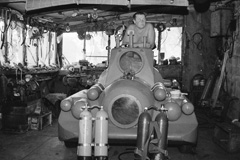Mr. Pilipenko and His Submarine
Herr Pilipenko und sein U-Boot GERMANY / 2006 / Russian, Ukrainian / Color / Video / 90 min
GERMANY / 2006 / Russian, Ukrainian / Color / Video / 90 min
Directors, Script: Jan Hinrik Drevs, René Harder
Photography: Florian Melzer
Editing: Renate Ober
Sound: Torsten Silbermann
Music: Hinrich Dageför, Frank Wulff, Stefan Wulff, Henning Stoll
Producers: Jens Fintelmann, Thomas Seekamp
Executive Producers: Hubert Marady, Wolfgang Kramer
Production Company, Source: nonfictionplanet film & television GmbH
When something is impossible in Ukraine, they say, “It’s like a submarine in the steppe.” Vladimir Pilipenko is a sixty-two-year-old pensioner living in a small Ukrainian village. For thirty years he has dreamed of building a submarine and submerging it in the Black Sea. He pours his heart into building the submarine, using his secretly saved pension to buy old parts and metal. But his passion is ignored by his wife, and ridiculed by people in the village. Undeterred, he heads for the Black Sea 400 km away, loading the submarine onto a battered truck and crossing vast expanses of plains. Can Pilipenko really transform the impossible into reality?
[Director’s Statement] As soon as I read about Pilipenko, I knew immediately that I had to make a film about this man and his dream. For me, he’s the classic hero. His story is one of hope, strength, and vitality that survives—and is driven by—the poverty of the no man’s land in Ukraine. Even before I met Pilipenko, I felt a deep bond with him and by the time we’d shot the film together, we were almost like family. Without Vladimir Pilipenko we could never have made this film, and without people like him, the world would be a poorer place.
—Jan Hinrik Drevs
Since my directing and acting education in Moscow in 1991 and St. Petersburg in 1992–93, I have felt connected to the people and the country. Through my language abilities, I am always able to help friends who have something to do with the CIS states. In 2003, I made arrangements for a visit by the magazine mare to Pilipenko. Pilipenko assumed that I would be accompanying the reporters. I had to defer, then spontaneously promised to visit sometime later. In Pilipenko I found a man who answered the question of how someone, while fighting through the hardships of everyday life, still doesn’t let go of what makes life worth living: his dreams.
—René Harder
 Jan Hinrik Drevs
Jan Hinrik Drevs
Drevs was born and grew up in Luebeck, North Germany. While studying rhetoric, broadcasting, and film at the University of Tübingen and San Francisco State he started to work as a TV journalist for various programs and stations. His work, for which he has received various awards, includes Caffé Trieste: Nostalgia dei Sensi (2002), Supercrabs in the Arctic Sea (2002), Paco Pacos: Jalopies in the Amazon Jungle (2004), and Eremitage: The Cat’s Palace (2005). This film is his first feature documentary as a director. This autumn he will direct his first fiction film, A Dog’s Life. The script, also by Drevs, was inspired by his experiences during a documentary shoot inside a US prison.  René Harder
René Harder
Born in 1971 and raised in Konstanz, Germany, Harder studied drama and stage direction at the State Drama School of St. Petersburg (Russia) as well as practical drama studies in Giessen. Harder holds a diploma in directing from the Institute of Theatre, Musical Theatre, and Film at the University of Hamburg. Since 1998, he has worked as a director, author, and actor at several theatres in Hamburg, Görlitz, and Leipzig, and has begun writing plays independently. Performances of the play Cold Plate were greatly celebrated by audiences and the media alike in northern Germany in 1998. Another play written by Harder has been performed every year since 2002 in Görlitz. His real passion, however, is for directing films. His short films Close and First Sight were shown at the Nordic Film Festival. |
